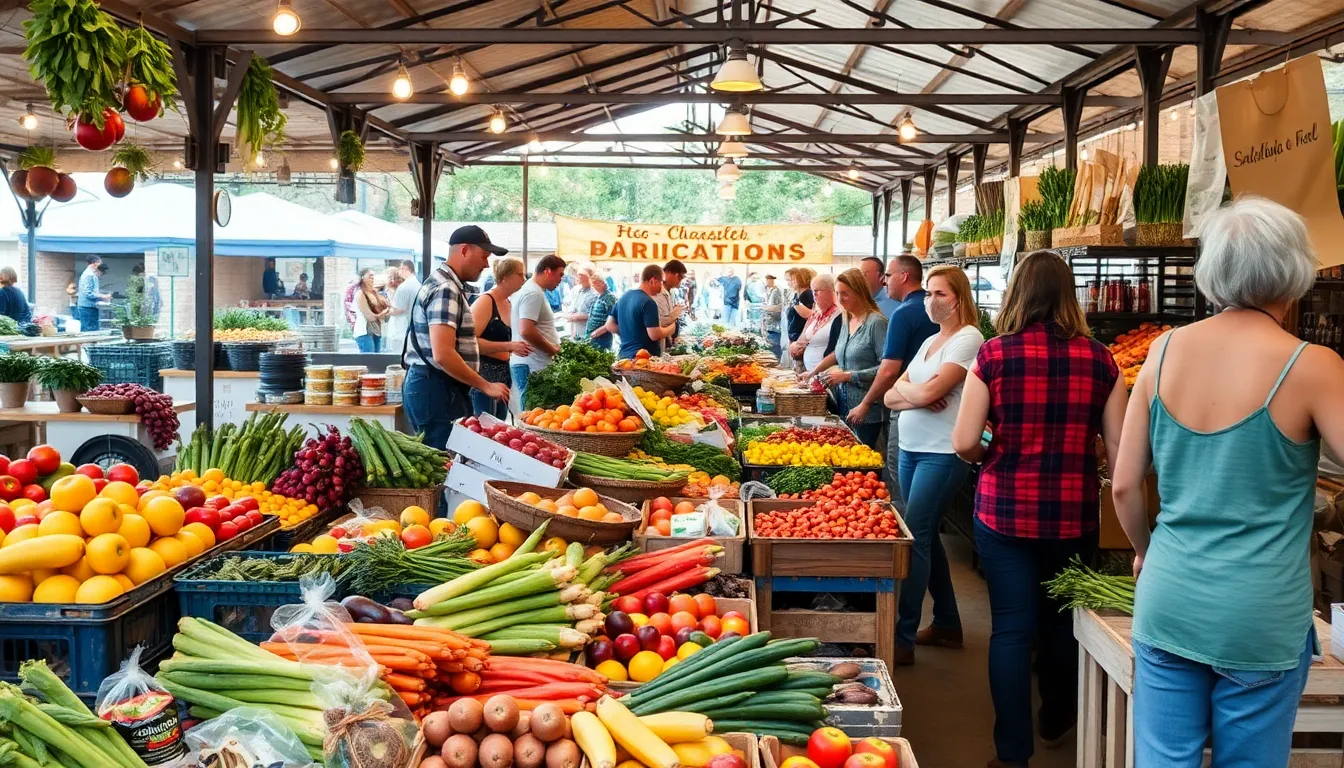In a world where kale reigns supreme and avocados are practically a food group, healthy eco recipes are the culinary superheroes we didn’t know we needed. These delightful dishes not only nourish the body but also save the planet one bite at a time. Who knew that eating green could be this delicious and eco-friendly?
Imagine whipping up a meal that’s not just good for you but also good for Mother Earth. From vibrant veggie stir-fries to scrumptious grain bowls, healthy eco recipes offer a feast of flavors without the guilt. So grab your reusable bags and get ready to impress your taste buds while reducing your carbon footprint. It’s time to turn your kitchen into an eco-friendly haven where every meal is a step toward a healthier planet.
Table of Contents
ToggleWhat Are Healthy Eco Recipes?
Healthy eco recipes blend nutrition with sustainability. These recipes focus on plant-based ingredients that nourish the body while minimizing environmental impact. Seasonal vegetables and whole grains frequently feature in these dishes, promoting local agriculture and reducing carbon footprints.
Whole foods such as legumes, nuts, and seeds provide essential nutrients. They enhance flavors and textures without the need for processed counterparts. Many recipes, like quinoa salads or roasted vegetable medleys, illustrate how easy it is to create balanced meals.
Cooking at home fosters a connection to ingredients and their origins. Utilizing organic produce ensures fewer pesticides and promotes biodiversity. By choosing sustainable sources, individuals support eco-friendly practices.
Preparation methods also play a role in healthy eco recipes. Techniques such as steaming or grilling maintain nutrient density, enhancing the overall health benefits. Reducing food waste becomes a priority, with many dishes creatively repurposing leftovers into new meals.
Community involvement further enriches the experience of healthy eco recipes. Joining local co-ops or farmers’ markets facilitates access to fresh, seasonal produce. Sharing recipes and experiences among peers fosters a culture of health and sustainability.
Through this approach, individuals craft meals that are not only good for them but also for the planet. Healthy eco recipes encourage creativity in the kitchen, inviting individuals to explore new flavors while promoting a mindful lifestyle. Each choice in meal preparation becomes a step towards a healthier future for everyone.
Benefits of Healthy Eco Recipes

Healthy eco recipes offer numerous benefits that enhance personal well-being and support environmental sustainability. Focusing on wholesome ingredients creates a positive impact on both health and the planet.
Nutritional Advantages
A rich array of nutrients comes from plant-based ingredients. Whole grains provide essential fiber while reducing the risk of chronic diseases. Seasonal vegetables supply vital vitamins and minerals, enhancing immunity. Legumes, nuts, and seeds contribute healthy fats and proteins, promoting satiety. These ingredients, often organic, minimize exposure to harmful pesticides. Balanced meals foster better digestion and energy levels throughout the day. This focus on nutrition not only supports individual health goals but encourages a lifestyle centered around wellness.
Environmental Impact
Cooking with local produce reduces carbon footprints significantly. Seasonal vegetables support local farmers and promote biodiversity. Utilizing organic ingredients helps protect ecosystems by minimizing synthetic pesticide use. Reducing food waste through creative recipes contributes to sustainable practices. Engaging in community initiatives like farmers’ markets strengthens connections to local agriculture. This commitment to eco-friendly cooking practices positively influences the environment. Embracing healthy eco recipes cultivates a culture of sustainability and mindful consumption, paving the way for a healthier planet.
Key Ingredients for Healthy Eco Recipes
Healthy eco recipes rely on key ingredients that enhance both health and sustainability. These components play a crucial role in creating nutritious meals while supporting eco-friendly practices.
Local and Organic Produce
Local produce boosts freshness and flavor. Its sourcing minimizes transportation emissions, promoting environmental sustainability. Seasonal selections encourage diverse menus and enhance nutrition. Organic fruits and vegetables reduce exposure to harmful pesticides, benefiting health and biodiversity. Farmers’ markets provide direct access to these sustainable options. Choosing organic also supports local farmers and strengthens community bonds, making it an integral part of healthy eco recipes.
Whole Grains and Legumes
Whole grains offer essential nutrients and fiber. Quinoa, brown rice, and farro are some great choices that increase satiety and promote digestive health. Legumes, including beans, lentils, and peas, add protein while enriching flavors and textures. Combining these ingredients creates satisfying meals while supporting heart health. Purchasing them in bulk also reduces packaging waste. Whole foods like these empower individuals to craft delicious, balanced dishes that align with eco-conscious cooking practices.
Popular Healthy Eco Recipes
Healthy eco recipes incorporate wholesome, plant-based ingredients that offer both nutritional benefits and sustainability. Exploring these options enriches dining experiences while promoting environmental stewardship.
Breakfast Ideas
Breakfast options include overnight oats topped with seasonal fruits and nuts. Smoothie bowls packed with leafy greens and organic berries deliver vital nutrients. Chia seed puddings rich in omega-3 fatty acids provide a healthy start to the day.
Lunch and Dinner Options
Lunch choices feature quinoa salads mixed with colorful vegetables and herbs. Grain bowls layered with roasted sweet potatoes and legumes boost energy levels for afternoon activities. Veggie stir-fries crafted from local produce offer vibrant flavors and essential vitamins.
Snacks and Desserts
Snack ideas encompass homemade granola bars infused with seeds and dried fruits. Dark chocolate avocado mousse serves as a nutritious dessert that satisfies sweet cravings. Baked apple slices sprinkled with cinnamon create a delightful and healthy treat.
Tips for Creating Your Own Healthy Eco Recipes
Utilize seasonal ingredients to enhance flavor while supporting local farmers. Starting with vegetables that are in season often results in tastier dishes and promotes biodiversity. Explore different cooking methods like grilling, steaming, or roasting to maintain nutrient density in meals.
Incorporate whole grains and legumes into recipes for added nutrition. Quinoa, brown rice, and lentils provide essential fibers, vitamins, and minerals that promote overall health. Experiment with various plant-based proteins to create satisfying and hearty meals.
Focus on reducing food waste by repurposing leftovers creatively. Transform day-old grains into salads or use excess vegetables in soups and stir-fries. Engaging in this practice not only minimizes waste but also inspires culinary creativity.
Choose organic produce whenever possible to reduce pesticide exposure and environmental impact. Organic farming practices support ecosystem health and promote sustainable agriculture, contributing to a healthier planet.
Join local co-ops or farmers’ markets to access fresh and organic ingredients directly. Building relationships with local growers enhances community ties and fosters a more sustainable food system.
Innovate flavors by using herbs and spices generously, which can elevate simple dishes. Fresh herbs, like basil or cilantro, add vibrant flavors while providing health benefits.
Document personal recipes to inspire others and share experiences. Encouraging discussions about healthy eco recipes fosters a community of like-minded individuals committed to sustainable living.
Embracing healthy eco recipes is a powerful way to enhance personal well-being while nurturing the planet. By focusing on plant-based ingredients and sustainable practices, individuals can create meals that are both delicious and environmentally friendly.
The journey into healthy cooking not only fosters a deeper connection to food but also encourages a lifestyle that prioritizes mindfulness and community engagement. As more people adopt these practices, the collective impact on health and the environment becomes increasingly significant.
Transforming everyday meals into eco-conscious creations paves the way for a healthier future. With every bite, individuals contribute to a more sustainable world while enjoying the rich flavors of nature’s bounty.




